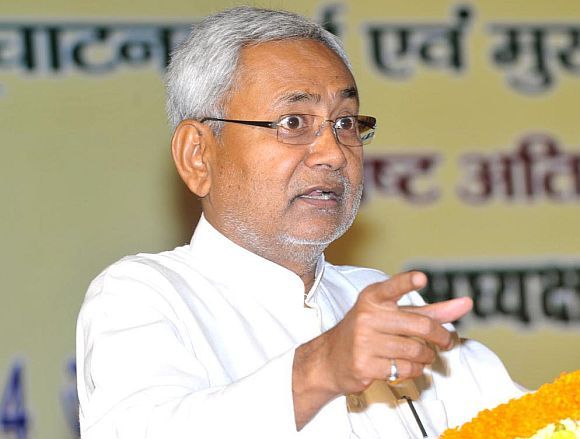 Bihar Chief Minister Nitish Kumar had parted ways with the Bharatiya Janata Party in 2013, citing the looming “hegemonic” presence of a leader in the saffron party.
Bihar Chief Minister Nitish Kumar had parted ways with the Bharatiya Janata Party in 2013, citing the looming “hegemonic” presence of a leader in the saffron party.
Kumar did not take any names, but it was clear that the leader in question was none other than Narendra Modi, the BJP’s campaign committee chief for the 2014 polls, who went on to become the prime minister.
But then, there are no permanent friends and enemies in politics.
Here is a look at Kumar’s previous statements, made after he quit the NDA alliance, which proves the adage:
>> 2013 (after breaking 17-year-long alliance with the BJP):
“We cannot compromise with our basic principles. We are not worried about the consequences. But we had no alternative now. We are not responsible. We were forced to take this decision.”
>> 2015: “The BJP is a political outfit of the Rashtriya Swayamsevak Sangh and
Swayamsevaks and pracharaks are part of this government. The RSS view is final. Whatever the BJP might say, it has no meaning. Like anything is decided by the Constitutional bench of the Supreme Court, it is final and there is nothing after that.”
>> 2015: “He (Modi) raised question over my DNA. He called Lalu Prasad a ‘shaitan’ and me an ‘ahankari’. Does speaking in such a language behove a person sitting on the responsible post of a PM?”
>> 2016: “Sangh-mukt Bharat banane ke liye sabhi gair BJP parties ko ek hona hoga (to usher in a Sangh-free India all non-BJP parties have to come together).
On Wednesday, Kumar embraced the BJP once again, responding to the voice of his “conscience”. He went on to thank Modi from the “core of my heart” for praising his decision of quitting.
“Whatever decision we have taken will be in the interest of Bihar and of its people. It will ensure development and justice. It will also ensure progress. This is a collective
decision.
“I favoured opposition unity... but what kind of opposition unity was going to be there... there was no discourse, no agenda. Having a reactive agenda will not do,”
he said.










